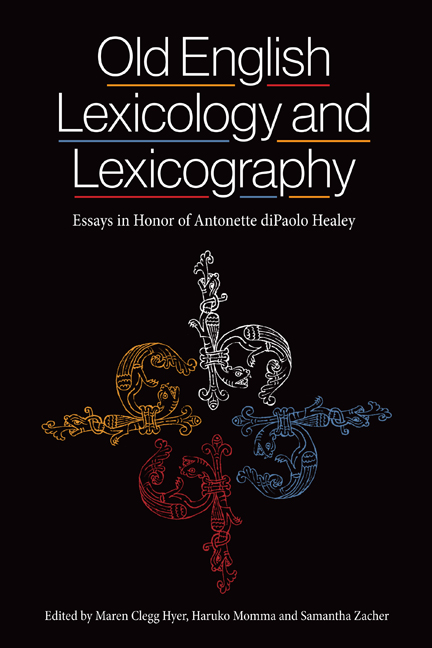Book contents
- Frontmatter
- Dedication
- Contents
- List of Illustrations
- List of Contributors
- Acknowledgements
- Abbreviations
- Introduction
- I Old English Poets and their Word-Craft
- 1 Beowulf and the Art of Invention
- 2 Juliana 53a Revisited (hætsð hæþenweoh)
- 3 Wounds and Compensation in the Old English Soul and Body Poems
- II Old English Homiletic Tradition
- 4 Defining and Redefining: Ælfric's Access to Gregory's Homiliae in Evangelia in the Composition of the Catholic Homilies
- 5 Lambeth Homily 4 and the Textual Tradition of the Visio Pauli
- 6 ‘A Vision of Souls’: Charity, Judgment, and the Utility of the Old English Vision of St. Paul
- 7 The Vocabulary of Sin and the Eight Cardinal Sins
- III Anglo-Saxon Institutions
- 8 The King (and Queen) and ‘I’: Self-Construction in Some Anglo-Saxon Royal Documents
- 9 Anglo-Saxon Maccabees: Political Theology in Ælfric's Lives of Saints
- 10 Nunne in Early Old English: Misogyny in its Literary Context
- IV Lexis of the Quotidian
- 11 Cingulum est custodiam: Semiotics and the Semantic Range of gyrdels
- 12 Island Time: The English Day and the Christian Hours
- 13 ‘Revising Hell’: The Voices of Teachers in Anglo-Saxon Studies and Anglo-Saxon England
- V The Task of the Lexicographer
- 14 Cryptography and the Lexicographer: Codifying the Code
- 15 Genre and the Dictionary of Old English
- Epilogue: Word-Hord
- 16 Reading Beowulf with Isidore's Etymologies
- An Old English Lexicon Dedicated to Toni Healey
- Toni Healey: A Tribute
- List of publications of Antonette diPaolo Healey
- Index
- Tabula Gratulatoria
- Miscellaneous Endmatter
- Anglo-Saxon Studies
6 - ‘A Vision of Souls’: Charity, Judgment, and the Utility of the Old English Vision of St. Paul
Published online by Cambridge University Press: 17 September 2020
- Frontmatter
- Dedication
- Contents
- List of Illustrations
- List of Contributors
- Acknowledgements
- Abbreviations
- Introduction
- I Old English Poets and their Word-Craft
- 1 Beowulf and the Art of Invention
- 2 Juliana 53a Revisited (hætsð hæþenweoh)
- 3 Wounds and Compensation in the Old English Soul and Body Poems
- II Old English Homiletic Tradition
- 4 Defining and Redefining: Ælfric's Access to Gregory's Homiliae in Evangelia in the Composition of the Catholic Homilies
- 5 Lambeth Homily 4 and the Textual Tradition of the Visio Pauli
- 6 ‘A Vision of Souls’: Charity, Judgment, and the Utility of the Old English Vision of St. Paul
- 7 The Vocabulary of Sin and the Eight Cardinal Sins
- III Anglo-Saxon Institutions
- 8 The King (and Queen) and ‘I’: Self-Construction in Some Anglo-Saxon Royal Documents
- 9 Anglo-Saxon Maccabees: Political Theology in Ælfric's Lives of Saints
- 10 Nunne in Early Old English: Misogyny in its Literary Context
- IV Lexis of the Quotidian
- 11 Cingulum est custodiam: Semiotics and the Semantic Range of gyrdels
- 12 Island Time: The English Day and the Christian Hours
- 13 ‘Revising Hell’: The Voices of Teachers in Anglo-Saxon Studies and Anglo-Saxon England
- V The Task of the Lexicographer
- 14 Cryptography and the Lexicographer: Codifying the Code
- 15 Genre and the Dictionary of Old English
- Epilogue: Word-Hord
- 16 Reading Beowulf with Isidore's Etymologies
- An Old English Lexicon Dedicated to Toni Healey
- Toni Healey: A Tribute
- List of publications of Antonette diPaolo Healey
- Index
- Tabula Gratulatoria
- Miscellaneous Endmatter
- Anglo-Saxon Studies
Summary
The current piece offers a translation of the Old English Vision of St. Paul from the edition provided in Professor Antonette diPaolo Healey's monograph of 1978. In so doing, I am at length returning to the wish-list I made in 1986, when I was introduced to this prose piece as a Masters student. I was greatly intrigued by the apocalyptic text in part because of its association with Beowulf, which I was at the time reading in Professor Healey's graduate course. And yet, I confess, I was unable to read the Old English Vision in its entirety back then, because much of my energy was spent on deciphering the longest poetic narrative in Old English. Wouldn't it have been so useful, I remember thinking, if there had been a translation of the Old English Vision for the classroom? My desire for such a modern text became even stronger when I realized, sometime later, that the Visio Sancti Pauli was so popular that its Old English rendition was only one of the many translations made in medieval languages: a translation of the Anglo-Saxon version would be of much use not only to students of Old English but also to scholars interested in the textual transmission of this New Testament apocalypse.
I hope that this short chapter and a small piece of translation will be a tribute worthy enough for Professor Healey, who is a caring teacher and a devoted scholar for the dissemination of knowledge in Old English studies and in medieval studies at large. My translation, which is provided at the end of this piece, includes not only all of the extant Old English Vision of St. Paul but also portions of the material that occurs immediately before and immediately after the Vision in the manuscript – Oxford, Bodleian Library, MSS Junius 85 and 86. In so doing, I am following Professor Healey's recommendation that the Old English Vision be read in its manuscript context. As will be discussed in detail below, the quire containing the sole extant Old English version of the Visio Pauli is inserted into what was originally a separate homily dealing with the theme of the address of the soul to the body.
- Type
- Chapter
- Information
- Old English Lexicology and LexicographyEssays in Honor of Antonette diPaolo Healey, pp. 94 - 109Publisher: Boydell & BrewerPrint publication year: 2020



